26 start with J start with J
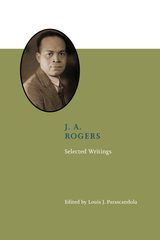
“No man living has revealed so many important facts about the Negro race as has Rogers,” wrote W. E. B. DuBois. Indeed, as Henry Louis Gates Jr. contends, J. A. Rogers was often the only source for an ordinary Black person to learn of their history from the 1920s through the 1970s. Now Louis J. Parascandola makes available an accessible collection of Rogers’s writings for a new generation.
Joel Augustus Rogers was born in Negril, Jamaica, in the late nineteenth century, where—although his father was a teacher—he received only basic education. Rogers emigrated to the United States and studied at the Art Institute of Chicago while working as a Pullman porter. He later took up journalism and moved to New York for better opportunities, writing for papers and journals published by the likes of Marcus Garvey, W. E. B. DuBois, and H. L. Mencken. While working with the Pittsburgh Courier, he was assigned to cover the Italo-Ethiopian War (1935–1937), becoming the first American Black foreign war correspondent. His column for the Courier became vital to the Black middle class, conveying stories of Black achievements and relating a distinguished history that imparted knowledge and pride. He continued this work with his books 100 Amazing Facts about the Negro with Complete Proof, the two-volume The World’s Great People of Color 3000 B.C. to 1946 A.D., and the novel From Superman to Man.
This engaging collection represents the wide range of Rogers’s work across time and demonstrates his intellectual philosophy. J. A. Rogers: Selected Writings is required reading for anyone interested in Black nationalism, Black journalism, Black literature, and Pan-African culture and identity.
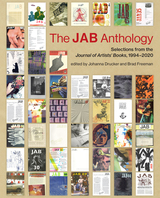
The JAB Anthology contains contributions by many renowned figures in the field including: Anne Moeglin-Delcroix, Janet Zweig, Monica Carroll, Adam Dickerson, Alisa Scudamore, Mary Jo Pauly, April Sheridan, Doro Boehme, Gerrit Jan de Rook, Océane Delleaux, Brandon Graham, Jérôme Dupeyrat, Ward Tietz, Paulo Silveira, Philip Cabau, Leszek Brogowski, Lyn Ashby, Tim Mosely, Debra Parr, Pedro Moura, Levi Sherman, Catarina Figueiredo Cardoso, Isabel Baraona, and the editors.
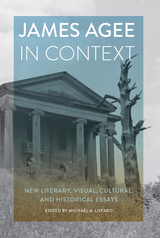
It’s difficult to overestimate the impact of the many new works by James Agee uncovered and published in the last twenty years. These previously unknown primary works have, in turn, encouraged a parallel explosion of critical evaluation and reevaluation by scholars, to which James Agee in Context is the latest contribution.
This superb collection from well-known James Agee scholars features myriad approaches and contexts for understanding the author’s fiction, poetry, journalism, and screenwriting. The essays bring the reader from the streets of James Agee’s New York to travel with the author from Alabama to Hollywood to Havana. Contributors explore overlapping and sometimes unique subjects, themes, and accomplishments (or lack thereof) in Agee’s uncovered works and highlight the diversity of interest that Agee’s complete body of work inspires. The insightful scholarship on influence examines connections between Agee and Wright Morris, Helen Levitt, John Dos Passos, Ernest Hemingway, and Stephen Crane. Such juxtapositions serve to illustrate how Agee drew on literary influences as a young man, how he used his work as a journalist to craft fiction as he was about to turn thirty, and his influence upon others. The volume concludes with three poems and a short story by Agee, all previously unknown.
It seems astonishing that so much remains to be discovered about this protean author, his materials, and his circle. Yet, the recovery and analysis of neglected texts and information mined from newspapers and magazines proves the extent to which Agee kept his mind and his work, as he himself put it, “patiently concentrated upon the essential quietudes of the human soul.”
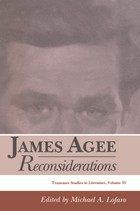
Continually exploring new fields, Agee achieved success as a poet, journalist, and essayist, as well as a writer of screenplays and fiction. Agee's sense of place, ingrained in him during his boyhood in Knoxville, Tennessee, provided the ground upon which he tested the temper of his creative process and his beliefs and attempted to reconcile the Romantic and Modern viewpoints into what he termed a "whole of consciousness."
But the price of attempting transcendence was high. At times Agee ravaged his own life in a quest to dissolve the barrier between reality and art; at other times, his gusto and vitality were converted into unique and innovative works like the audacious and uncategorizable Let Us Now Praise Famous Men and the highly charged autobiographical novel A Death in the Family. The essays in this volume, drawn in part from the 1989 "Agee Legacy" symposium, focus upon these two major works and upon Agee's explorations of narrative technique. The authors demonstrate that the measure of Agee's success is in large part the direct result of his supposed flaws: his variety of subject and form, and his life of often reckless abandon.
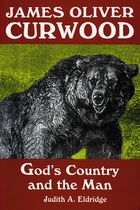
When the wounded bear he faced on a mountain ledge that day turned aside, James Curwood felt that he had been spared. From this encounter he became an avid conservationist. He wrote relentlessly—magazine stories and books and then for the new medium of motion pictures. Like many authors of his time, he was actively involved in movie-making until the plight of the forests and wildlife in his home state of Michigan turned his energies toward conservation.
A man ahead of his time, and quickly forgotten after his death in 1927, his gift of himself to his readers and to nature has finally come to be appreciated again two generations later.
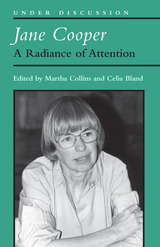
Martha Collins and Celia Bland bring together several decades’ worth of essential writing on Cooper’s poetry. While some pieces offer close examination of Cooper’s process or thoughtful consideration of the craft of a single poem, the volume also features reviews of her collections, including a previously unpublished piece on her first book, The Weather of Six Mornings (1969), by James Wright, a lifelong champion of her work. Marie Howe, Jan Heller Levi, and Thomas Lux, among others, share personal remembrances of Cooper as a teacher, colleague, and inspiration. L. R. Berger’s moving tribute to Cooper’s final days closes the volume. This book has much to offer for both readers who already love Cooper’s work and new readers, especially among younger poets, just discovering her enduring poems.
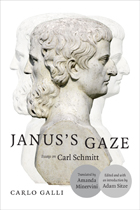
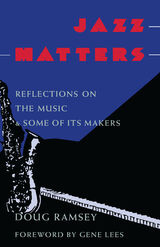
Rich in anecdote and insight, Jazz Matters is a collection of essays, profiles, and reviews by Doug Ramsey, and observer and chronicler of jazz and its musicians for more than thirty years. It stirs the reader to discover or rediscover the music and performers Ramsey describes. His accounts of recording sessions and live performances enhance this excellent review of the history, variety, and artistic depth that make jazz so profound an element in modern culture.
Jazz Matters gives the reader a basis for understanding jazz improvisation Ramsey’s sensitive, straightforward, and entertaining pieces promote appreciation of the accomplishment of artists from Louis Armstrong to John Coltrane and Ornette Coleman.

Jens Jensen (1860–1951) was one of America's most distinguished landscape architects and a pioneering conservationist. During his long and productive career, this Danish-born visionary worked for and with some of the country's most prominent citizens and architects, including Henry Ford, Louis Sullivan, and Frank Lloyd Wright. He became internationally renowned for his design of landscapes throughout the Midwest and beyond, his contributions to the American conservation movement, and his philosophy that emphasized the significance of nature in people's lives. He found inspiration in the landscape, particularly the plants native to a region, and was an environmentalist long before the term became popular.
Today, Jensen is perhaps best remembered for establishing The Clearing on Wisconsin's Door County Peninsula. But the outspoken views in his writings—many of which were included in ephemeral planning reports, early newspapers, and out-of-print journals—are now virtually forgotten, with the exception of his two small books. Jens Jensen: Writings Inspired by Nature is a collection of Jensen's most significant yet lesser-known articles. The scope of Jensen's philosophy represented in these writings will further solidify his legacy and rightful place alongside conservation leaders such as John Muir and Aldo Leopold.
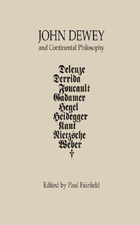
“These essays build a valuable, if virtual, bridge between the thought of John Dewey and that of a host of modern European philosophers. They invite us to entertain a set of imagined conversations among the mighty dead that no doubt would have intrigued Dewey and each of the interlocutors gathered here.”—Robert Westbrook, author of John Dewey and American Democracy and/or Democratic Hope: Pragmatism and the Politics of Truth.
John Dewey and Continental Philosophy provides a rich sampling of exchanges that could have taken place long ago between the traditions of American pragmatism and continental philosophy had the lines of communication been more open between Dewey and his European contemporaries. Since they were not, Paul Fairfield and thirteen of his colleagues seek to remedy the situation by bringing the philosophy of Dewey into conversation with several currents in continental philosophical thought, from post-Kantian idealism and the work of Friedrich Nietzsche to twentieth-century phenomenology, hermeneutics, and poststructuralism.
John Dewey and Continental Philosophy demonstrates some of the many connections and opportunities for cross-traditional thinking that have long existed between Dewey and continental thought, but have been under-explored. The intersection presented here between Dewey’s pragmatism and the European traditions makes a significant contribution to continental and American philosophy and will spur new and important developments in the American philosophical debate.
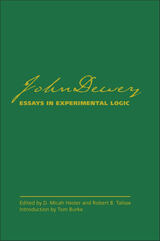
Offering a new edition of Dewey’s 1916 collection of essays
This critical edition of John Dewey’s 1916 collection of writings on logic, Essays in Experimental Logic—in which Dewey presents his concept of logic as the theory of inquiry and his unique and innovative development of the relationship of inquiry to experience—is the first scholarly reprint of the work in one volume since 1954. Essays in Experimental Logic, edited by D. Micah Hester and Robert B. Talisse, uses the authoritative texts from the Collected Works of John Dewey, 1882–1953 (published by Southern Illinois University Press) and includes as well articles from leading journals representing various contemporary schools of philosophy that criticized Dewey’s experimentalism.
Culling materials from six volumes of the chronologically arranged Collected Works, this single-volume edition of Essays marks a crucial point in Dewey’s intellectual development: one in which Dewey critically engages idealistic and intuitionist theorists and lays the groundwork for his mature theory of inquiry. The text includes a new introduction by renowned Dewey scholar Tom Burke that places Essays in philosophical and historical context. In addition to the original essays, Essays in Experimental Logic also features five critical essays by Dewey’s contemporaries, including Bertrand Russell, Wendell T. Bush, R. F. Alfred Hoernlé, H. T. Costello, and C. S. Peirce.
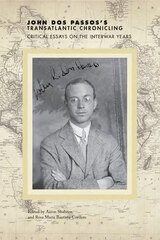
“I never could keep the world properly divided into gods and demons for very long,” wrote John Dos Passos, whose predilection toward nuance and tolerance brought him to see himself as a “chronicler”: a writer who might portray political situations and characters but would not deliberately lead the reader to a predetermined conclusion. Privileging the tangible over the ideological, Dos Passos’s writing between the two World Wars reveals the enormous human costs of modern warfare and ensuing political upheavals.
This wide-ranging and engaging collection of essays explores the work of Dos Passos during a time that challenged writers to find new ways to understand and render the unfolding of history. Taking their foci from a variety of disciplines, including fashion, theater, and travel writing, the contributors extend the scholarship on Dos Passos beyond his best-known U.S.A. trilogy. Including scholars from both sides of the Atlantic, the volume takes on such topics as how writers should position their labor in relation to that of blue-collar workers and how Dos Passos’s views of Europe changed from fascination to disillusionment. Examinations of the Modernist’s Adventures of a Young Man, Manhattan Transfer, and “The Republic of Honest Men” increase our understanding of the work of a complicated figure in American literature, set against a backdrop of rapidly evolving technology, growing religious skepticism, and political turmoil in the wake of World War I.
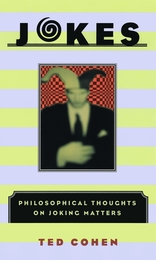
Sol sits on the sidewalk bench and waits patiently for nearly half an hour. Finally, Abe reappears.
"Well," asks Sol, "what are they up to? Who are they trying to convert? Why do they care? Did you get the $1,000?"
Indignantly Abe replies, "Money. That's all you people care about."
Ted Cohen thinks that's not a bad joke. But he also doesn't think it's an easy joke. For a listener or reader to laugh at Abe's conversion, a complicated set of conditions must be met. First, a listener has to recognize that Abe and Sol are Jewish names. Second, that listener has to be familiar with the widespread idea that Jews are more interested in money than anything else. And finally, the listener needs to know this information in advance of the joke, and without anyone telling him or her. Jokes, in short, are complicated transactions in which communities are forged, intimacy is offered, and otherwise offensive stereotypes and cliches lose their sting—at least sometimes.
Jokes is a book of jokes and a book about them. Cohen loves a good laugh, but as a philosopher, he is also interested in how jokes work, why they work, and when they don't. The delight at the end of a joke is the result of a complex set of conditions and processes, and Cohen takes us through these conditions in a philosophical exploration of humor. He considers questions of audience, selection of joke topics, the ethnic character of jokes, and their morality, all with plenty of examples that will make you either chuckle or wince. Jokes: more humorous than other philosophy books, more philosophical than other humor books.
"Befitting its subject, this study of jokes is . . . light, funny, and thought-provoking. . . . [T]he method fits the material, allowing the author to pepper the book with a diversity of jokes without flattening their humor as a steamroller theory might. Such a book is only as good as its jokes, and most of his are good. . . . [E]ntertainment and ideas in one gossamer package."—Kirkus Reviews
"One of the many triumphs of Ted Cohen's Jokes-apart from the not incidental fact that the jokes are so good that he doesn't bother to compete with them-is that it never tries to sound more profound than the jokes it tells. . . . [H]e makes you feel he is doing an unusual kind of philosophy. As though he has managed to turn J. L. Austin into one of the Marx Brothers. . . . Reading Jokes makes you feel that being genial is the most profound thing we ever do-which is something jokes also make us feel-and that doing philosophy is as natural as being amused."—Adam Phillips, London Review of Books
"[A] lucid and jargon-free study of the remarkable fact that we divert each other with stories meant to make us laugh. . . . An illuminating study, replete with killer jokes."—Kevin McCardle, The Herald (Glasgow)
"Cohen is an ardent joke-maker, keen to offer us a glimpse of how jokes are crafted and to have us dwell rather longer on their effects."—Barry C. Smith, Times Literary Supplement
"Because Ted Cohen loves jokes, we come to appreciate them more, and perhaps think further about the quality of good humor and the appropriateness of laughter in our lives."—Steve Carlson, Christian Science Monitor
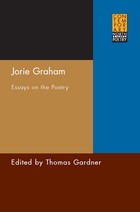
These essays identify three broad concerns that run through each of her strikingly different volumes of poems: the movement of the mind in action, the role of the body in experiencing the world, and the pressures of material conditions on mind and body alike. Gardner both shows how Graham is being read at the moment and charts new areas of investigation likely to dominate thinking about her over the next decade. This collection is sure to become the crucial first step for all future work on Graham and on American poetry of the last two decades.

Additional Information and Publicity
Electric Politics Review
World Hum Excerpt
Arroyo Monthly
San Bernardino Sun Christmas Pick
Los Angeles Times Profile
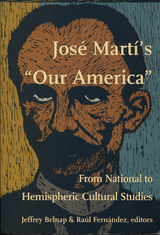
A Cuban exile from 1881 to 1895, Martí was a correspondent writing in New York for various Latin American newspapers. Grasping the significance of rising U.S. imperial power, he came to understand the Americas as a complex system of kindred—but not equal—national formations whose cultural and political integrity was threatened by the overbearing aggressiveness of the United States. This collection explores how in his journalistic work Martí critiques U.S. racism, imperialism, and capitalism; warns Latin America of impending U.S. geographical, cultural, and economic annexation; and calls for recognition of the diversity of America’s cultural voices. Reinforcing Martí’s hemispheric vision with essays by a wide range of scholars who investigate his analysis of the United States, his significance as a Latino outsider, and his analyses of Latin American cultural politics, this volume explores the affinities between Martí’s thought and current reexaminations of what it means to study America.
José Martí’s Our America offers a new understanding of Martí’s ambiguous and problematic relation with the United States and will engage scholars and students in American, Latin American, and Latino studies as well as those interested in cultural, postcolonial, gender, and ethnic studies.
Contributors. Jeffrey Belnap, Raúl Fernández, Ada Ferrer, Susan Gillman, George Lipsitz, Oscar Martí, David Noble, Donald E. Pease, Beatrice Pita, Brenda Gayle Plummer, Susana Rotker, José David Saldívar, Rosaura Sánchez, Enrico Mario Santí, Doris Sommer, Brook Thomas
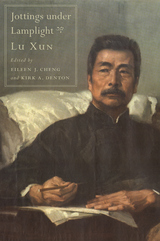
Lu Xun (1881–1936) is widely considered the greatest writer of twentieth-century China. Although primarily known for his two slim volumes of short fiction, he was a prolific and inventive essayist. Jottings under Lamplight showcases Lu Xun’s versatility as a master of prose forms and his brilliance as a cultural critic with translations of sixty-two of his essays, twenty of which are translated here for the first time.
While a medical student in Tokyo, Lu Xun viewed a photographic slide that purportedly inspired his literary calling: it showed the decapitation of a Chinese man by a Japanese soldier, as Chinese bystanders watched apathetically. He felt that what his countrymen needed was a cure not for their physical ailments but for their souls. Autobiographical accounts describing this and other formative life experiences are included in Jottings, along with a wide variety of cultural commentaries, from letters, speeches, and memorials to parodies and treatises.
Lu Xun was remarkably well versed in Chinese tradition and playfully manipulated its ancient forms. But he also turned away from historical convention, experimenting with new literary techniques and excoriating the “slave mentality” of a population paralyzed by Confucian hierarchies. Tinged at times with notes of despair, yet also with pathos, humor, and an unparalleled caustic wit, Lu Xun’s essays chronicle the tumultuous transformations of his own life and times, providing penetrating insights into Chinese culture and society.
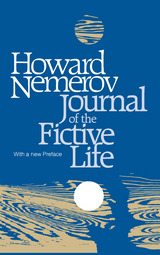
"He often shows bravery and shrewdness; the book is full of fine criticism and psychological insight. As always, his prose has that ease and transparency that make one forget one is reading; one seems simply to hear a voice speaking. Nemerov's improvised self-analysis has weaknesses, but few that he himself doesn't eventually recognize."—New York Times Book Review
"In an age of explicitness, Nemerov's Journal of the Fictive Life is explicitly without vulgarity; in an age of revelation, it reveals only what counts. More then a book about creativity, it is a beautiful creation."—Richard G. Stern

Renowned poet Richard Tillinghast’s wanderlust and restless spirit are nearly as well known as his verses. This book of essays captures that penchant to wander, yet Journeys into the Mind of the World is not merely a compilation of travel stories—it is a book of places. It explores these chosen locations—Ireland, England, India, the Middle East, Tennessee, Hawaii—in a deeper way than would be typical of travel literature, attempting to enter not just the world, but “the mind of the world”—the roots and history of places, their political and cultural history, spiritual, artistic, architectural, and ethnic dimensions.
Behind each essay is the presence, curiosity, and intelligence of the author himself, who uses his experience of the places he visits as a way of bringing the reader into the equation. Tillinghast illuminates his travels with a brilliant eye, a friendly soul, and eclectic knowledge of a variety of disparate areas—Civil War history, Venetian architecture, Asian cultures, Irish music, and the ways of out-of-the-way people. This attention to history and cultural embeddedness lends unique perspectives to each essay.
At the heart of his journeys are his deep roots in the South, tracing back to his hometown in Tennessee. The book explores not only Tillinghast’s childhood home in Memphis, but even the time before his birth when his mother lived in Paris. Readers will feel a sense of being everywhere at once, in a strange simultaneity, a time and place beyond any map or guidebook.
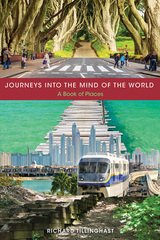
Renowned poet Richard Tillinghast’s wanderlust and restless spirit are nearly as well known as his verses. This book of essays captures that penchant to wander, yet Journeys into the Mind of the World is not merely a compilation of travel stories—it is a book of places. It explores these chosen locations—Ireland, England, India, the Middle East, Tennessee, Hawaii—in a deeper way than would be typical of travel literature, attempting to enter not just the world, but “the mind of the world”—the roots and history of places, their political and cultural history, spiritual, artistic, architectural, and ethnic dimensions.
Behind each essay is the presence, curiosity, and intelligence of the author himself, who uses his experience of the places he visits as a way of bringing the reader into the equation. Tillinghast illuminates his travels with a brilliant eye, a friendly soul, and eclectic knowledge of a variety of disparate areas—Civil War history, Venetian architecture, Asian cultures, Irish music, and the ways of out-of-the-way people. This attention to history and cultural embeddedness lends unique perspectives to each essay.
At the heart of his journeys are his deep roots in the South, tracing back to his hometown in Tennessee. The book explores not only Tillinghast’s childhood home in Memphis, but even the time before his birth when his mother lived in Paris. Readers will feel a sense of being everywhere at once, in a strange simultaneity, a time and place beyond any map or
guidebook.
RICHARD TILLINGHAST is the author of three recent books of poetry: Sewanee Poems (Evergreen, 2009; second edition, 2012), Selected Poems (Dedalus, Dublin, 2009), and Wayfaring Stranger (Word Palace, 2012). Among his nonfiction books are Finding Ireland (University of Notre Dame, 2008) and An Armchair Traveller’s History of Istanbul (Haus Publishing, London, 2012).

Each of the twelve essays considers a different poet—Edward Thomas, Henry W. Longfellow, George Scarbrough, Elizabeth Bishop, Geoffrey Hill, Primus St. John, Robert Hayden, Elizabeth Coatsworth, Gwendolyn Brooks, Robert Frost, E.A. Robinson, and Belle Randall—and, alongside them, different concerns of parenting and living. Organized in chronological order, they track the growth of Nathaniel Perry’s own children who pop up from time to time in a believable way. Essays consider the idea of devotion and belief, the idea of imperfection, the small details we can focus on as parents, and the conceptions of the world we pass along to our children. Together these essays not only represent the author's personal canon of poets who have been important to him in his life and work, but also present a diverse slice of American poetry, in voice, form, identity, origin, and time period.
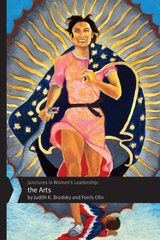
Amongst the women discussed are Bertha Honoré Palmer, Louise Noun, Samella Lewis, Julia Miles, Miriam Colón, Jaune Quick-To-See Smith, Bernice Steinbaum, Anne d’Harnoncourt, Martha Wilson, Jawole Willa Jo Zollar, Kim Berman, Gilane Tawadros, Joanna Smith, and Veomanee Douangdala.
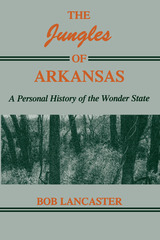
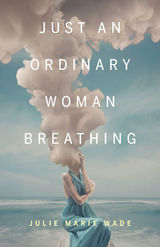
Finalist for the Publishing Triangle's Judy Grahn Award for Lesbian Nonfiction
You have a history, and a body. You are a history, and a body. Your body has (is) a history, too. As a girl, Julie Marie Wade was uninterested in makeup, boy-watching, and other trappings of conventional girlhood, much to her mother’s disappointment. Grace Kelly and Marilyn Monroe—movie stars immortalized as feminine ideals, even as they both died tragically and young—were lodestars that threw Wade’s own definition of beauty into relief as she stumbled into adulthood.
Now, in Just an Ordinary Woman Breathing, Wade traces the intimate story of coming of age in one particular body (as a lesbian, an only child, a Protestant attending Catholic school). She uses the language and tenets of music, math, religion, fairy tales, poetry, and art to reckon with the many facets of embodiment, sexuality, and love in our contemporary world. The diet industry, popular culture, and her own family all provide rich material for what is ultimately a lyrical and unflinching investigation into the questions that prickle deep within the human heart.
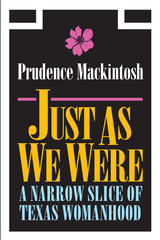
When a Texas debutante bows her forehead to the floor in the famous "Texas dip," society columnists all across the country speculate interminably over what it is that sets Texas women apart. But really, how could they know? Even women born and bred in Texas can't always answer that question.
Prudence Mackintosh comes very close to an answer, though, in this endlessly entertaining book. Writing with both a wry sense of humor and an insider's compassion, she offers us a fascinating look into the world of privileged, educated, well-married, well-connected, and mostly wealthy white Texas women.
What really sets these women apart, Ms. Mackintosh tells us, is the comfortable yet demanding path they follow from their idyllic girlhoods to prominent positions in society. In thirteen essays, some of which originally appeared in Texas Monthly magazine, she charts the way stations that mark this path: summer camps in the Texas Hill Country, exclusive private schools like Dallas' Hockaday, sorority membership, and acceptance into the Junior League.
Prudence Mackintosh has been both an outsider and an insider in this privileged world, and her observations are shot through with wit and real insight. Just As We Were may not be the final word on elite Texas women, but no other book has described their world with greater irony or accuracy.
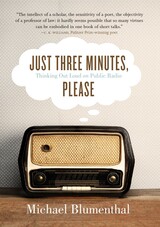
What’s wrong with the contemporary American medical system? What does it mean when a state’s democratic presidential primary casts 40% of its votes for a felon incarcerated in another state? What’s so bad about teaching by PowerPoint? What is truly the dirtiest word in America?
These are just a few of the engaging and controversial issues that Michael Blumenthal, poet, novelist, essayist, and law professor, tackles in this collection of poignant essays commissioned by West Virginia Public Radio.
In these brief essays, Blumenthal provides unconventional insights into our contemporary political, educational, and social systems, challenging us to look beyond the headlines to the psychological and sociological realities that underlie our conventional thinking.
As a widely published poet and novelist, Blumenthal brings along a lawyer’s analytical ability with his literary sensibility, effortlessly facilitating a distinction between the clichés of today’s pallid political discourse and the deeper realities that lie beneath. This collection will captivate and provoke those with an interest in literature, politics, law, and the unwritten rules of our social and political engagements.
READERS
Browse our collection.
PUBLISHERS
See BiblioVault's publisher services.
STUDENT SERVICES
Files for college accessibility offices.
UChicago Accessibility Resources
home | accessibility | search | about | contact us
BiblioVault ® 2001 - 2024
The University of Chicago Press









